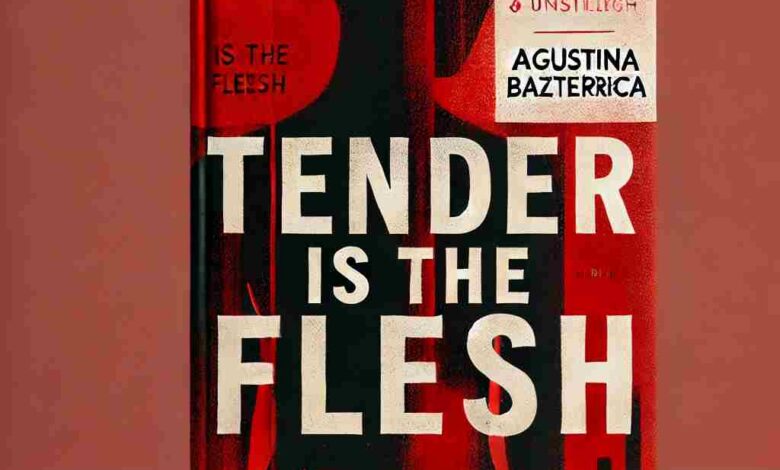Tender is the Flesh: Book Summary

“Tender is the Flesh,” written by Argentinian author Agustina Bazterrica, is a dystopian novel that challenges readers with its chilling and provocative narrative. Set in a world where a virus has made animal meat poisonous to humans, the story explores the horrifying consequences of society’s adaptation to this new reality—legalized cannibalism. The book, originally published in Spanish in 2017 and later translated into English, has garnered significant attention for its disturbing yet thought-provoking content.
A World Reimagined: The Premise
In a future where traditional livestock are afflicted by a deadly virus, the novel predicts that one by one, governments all over the world will eventually legalize the breeding of humans for meat consumption and euphemistically call it “special meat”. This changes their diet and breaks the usual limits of what they consume. Human beings are made subjects to the process of commodification, breeding, and slaughtering just like cattle in this gross industry.
The Protagonist: Marcos Tejo
The man at the heart of the story is Marcos Tejo. He is so deeply enmeshed in this grim new world. He works as an employee in a processing plant where the human specimens, called “head,” are butchered and processed to serve at the dinner table. Further, he is the one who procures human meat and the distribution involved with it. But deep inside him, Marcos is overwhelmed with conflicts about the morality of his work. The inner conflicts are further compounded by personal tragedies, as he is suffering from the loss of his son and dealing with the emotional distance between him and his estranged wife, Cecilia.
Marcos is a complex character: he is not a hero but also not a villain; he is only a man in an impossible situation. His inner turmoil comes to a fever pitch when he is gifted by a business contact with a female human, specifically a First Generation Pure, and whom he names Jasmine, who plays a pivotal role in his moral devolution. Initially, she becomes a problem for Marcos, but slowly enough, he begins to harbor an unfortunately strong fondness for her, and they two fall into an intimate and highly forbidden relationship.
Themes: Dehumanization and Moral Decay
“Tender is the Flesh” by Agustina Bazterrica explores themes of dehumanization and the commodification of human life. By normalizing cannibalism, she confronts readers with harsh truths about society’s cruelty. It is forcefully suggested that, under certain conditions, the moral compass of humanity can be irretrievably twisted toward accepting practices it would otherwise find monstrous.
This dehumanization is not just physical; it is also linguistic. Throughout the novel, human beings bred for consumption are stripped of their identity and labeled as a “head” or “product.” Such language removes the horror of the general public’s actions, making the unspeakable more palatable. It’s raw commentary on how language can be used to mask truth and normalize atrocities.
Moral Dilemmas and Ethical Conflicts
Marcos’s is a tale of moral shadow and ethical struggle. He is deeply embedded in the system, both following and suffering from the societal norms that dictate his actions. The relationship with Jasmine becomes a focal point of his ethical struggle. Having developed emotions for her, he finally succumbed to that same dehumanizing world order by which he is ailed. This culminates in a harrowing decision that underscores the extent of his moral compromise.
The novel also represents the psychological cost of living in a society where the unthinkable has become routine. Interaction with other characters also projects the attitude for adaptation or resistance towards such new norms. Marcos’s talks with his sister Marisa and estranged wife Cecilia show how people adapt to the new norms. For instance, she is fully complicit in the system, making use of it for her purpose without batting an eyelid, while Cecilia’s eventual complicity is a revelation of how seductive moral compromise can be when set against personal loss.
The Ending: A Bleak Conclusion
The climax of Tender is the Flesh is shocking as much as it is predictable. Her pregnancy and the birth of her child force Marcos to come face-to-face with the full horror of his actions. It’s a grim realization that forces him to kill Jasmine to cover up the truth, a symbol of moral descent. This isn’t just personal tragedy; it shows society’s collapse, where basic human bonds are sacrificed to preserve the status quo.
Critical Reception
Reviews of “Tender Is the Flesh” have praised and attacked its unflinching rawness in presenting a future. Some find Bazterrica’s world convincingly horrifying, while others struggle with the novel’s relentless darkness. Most notably, with all this having been said, the one thing that has not been neglected or denied the book is its powerful comment on human nature and potential moral decline under severe circumstances.
The Bottom Line
“Tender is the Flesh” is a very disturbing novel. The book is full of violence and discloses unpleasantly deep themes, so it can be quite disturbing. For those who can endure its darkness, the novel offers a powerful view of morality and society’s decline. It reminds us of the dangers when ethical boundaries are pushed to their limits.





